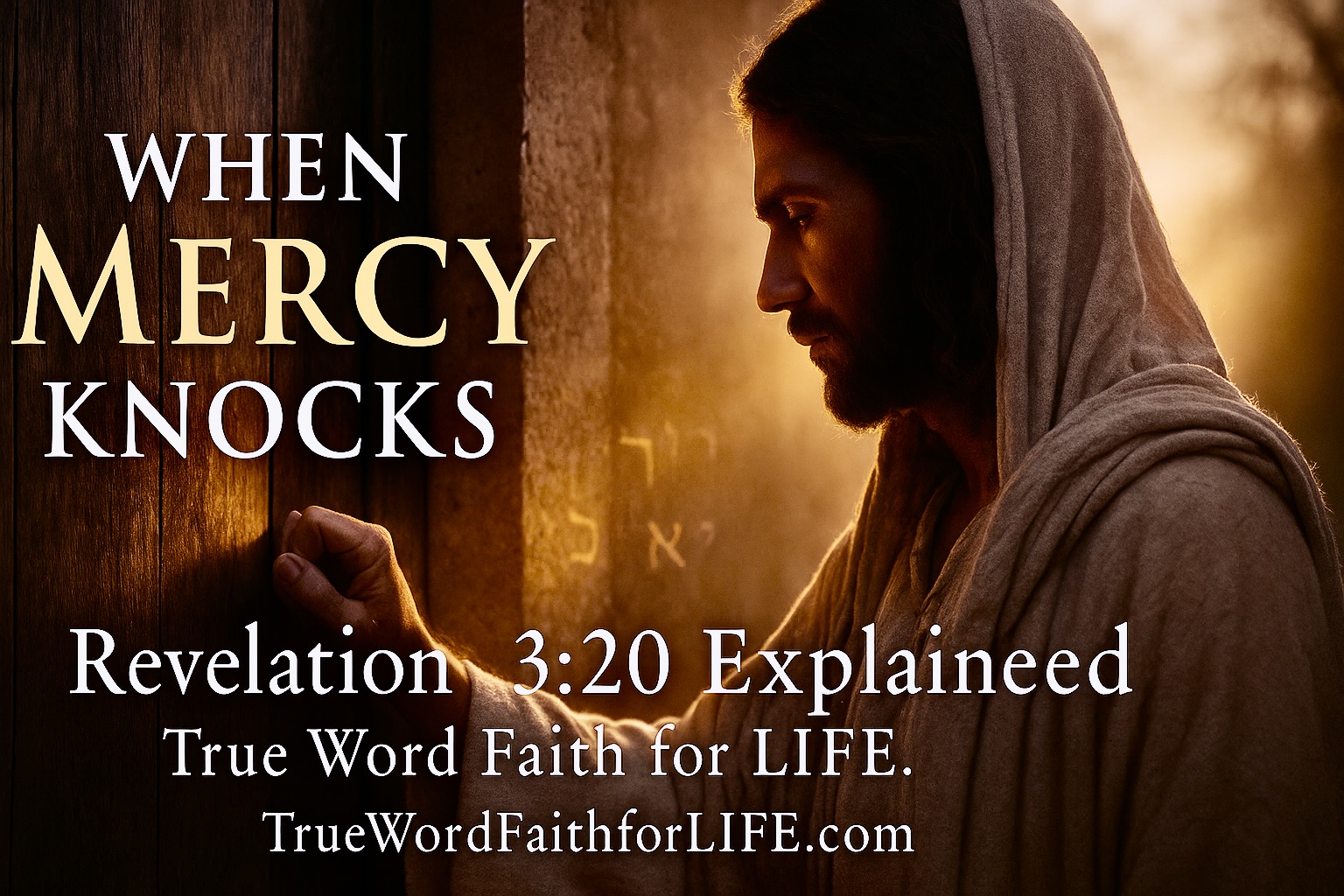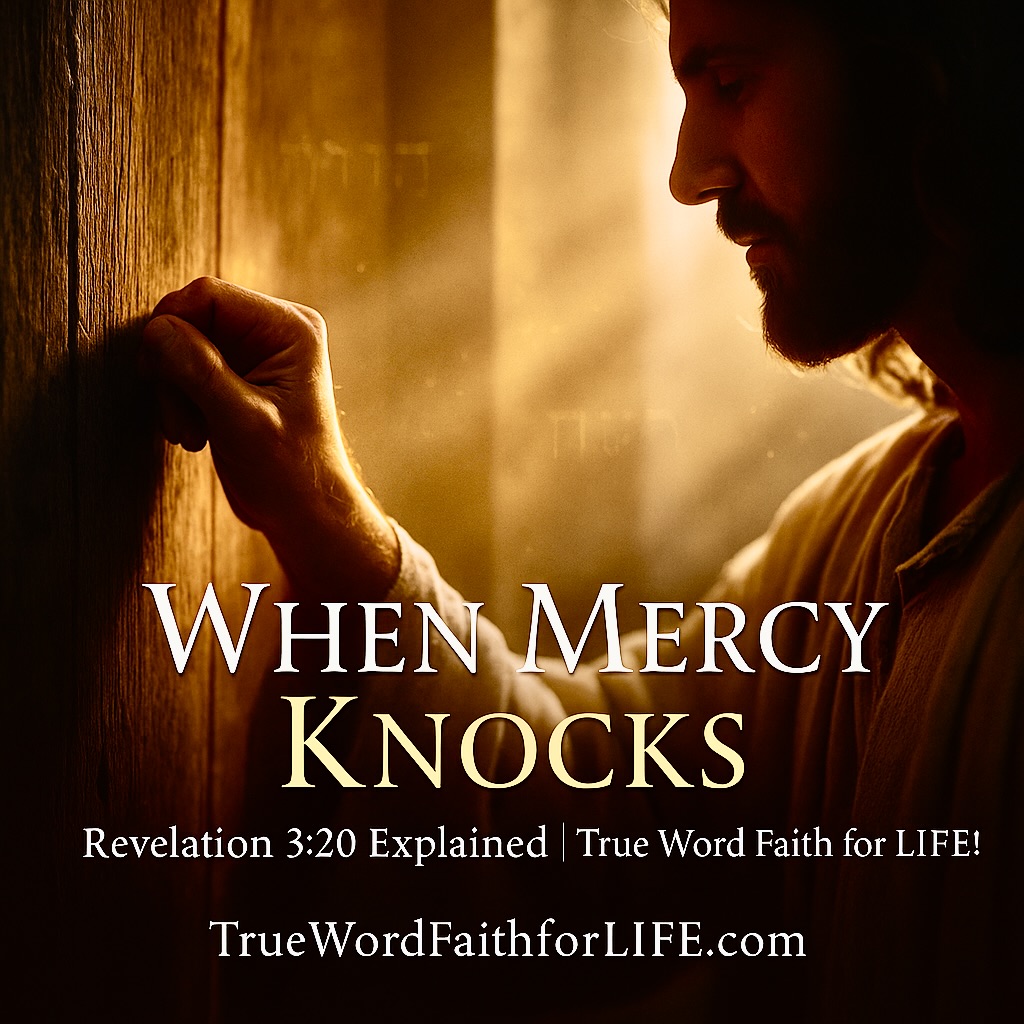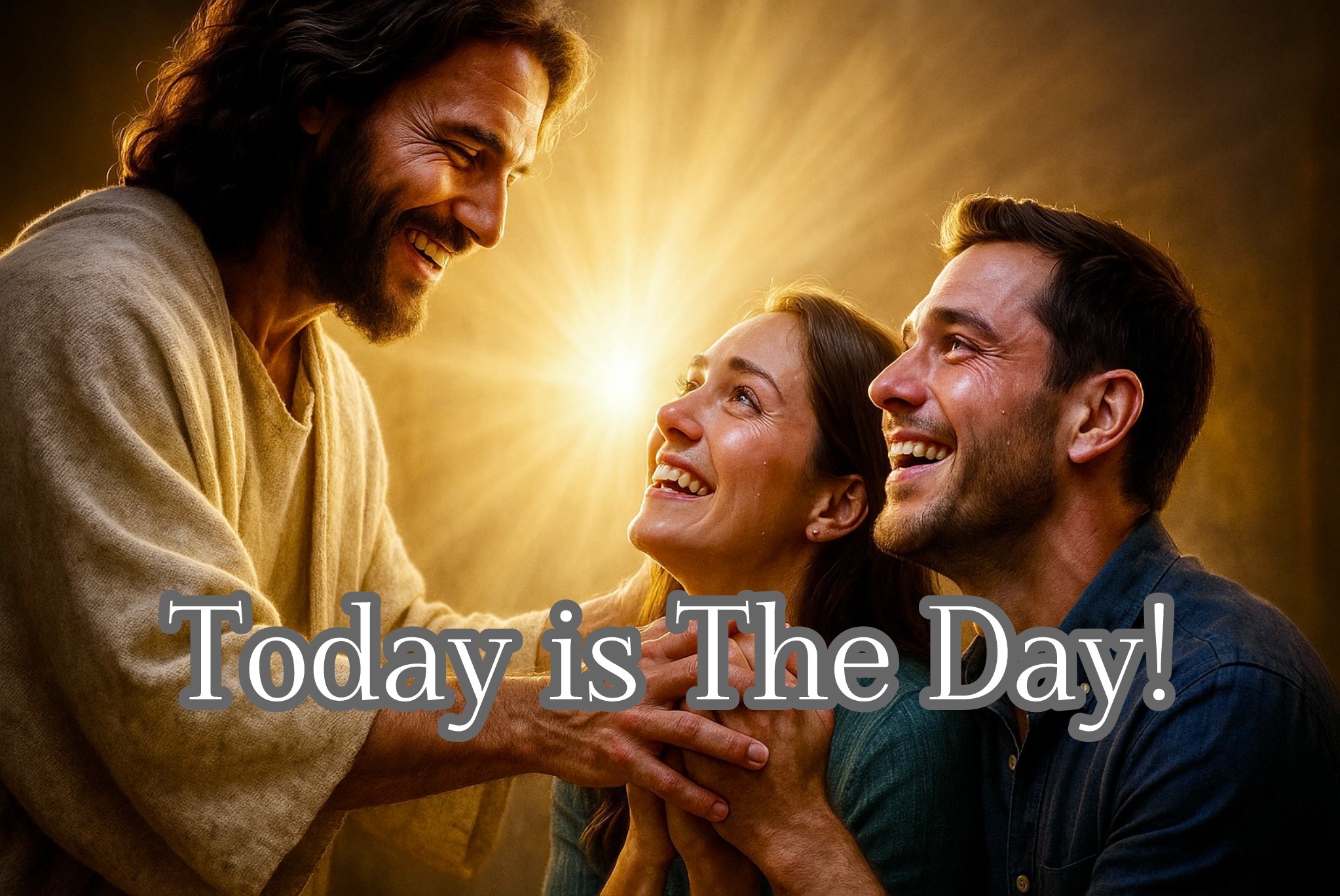What Does Revelation 3:20 REALLY Mean? | When Mercy Knocks

When Mercy Knocks: “Behold, I Stand at the Door and Knock” Explained
Series: Revelation: The Faithful Witness and the Final Word
© 2025 Dr. Shawn M. Greener. All Rights Reserved.
True Word, Faith for LIFE!
What if the knock echoing in your heart is not guilt or failure, but mercy calling you home?
What if Jesus is not standing outside a church door, but outside your weariness, your disappointment, your fear that He has finally given up on you?
Revelation 3:20 is not a verse about unbelievers. It is about believers who have grown comfortable while the King of Kings waits outside the walls of routine faith.
That gentle sound on the other side of your heart is not condemnation. It is covenant love, still knocking.
⸻
Join us Sunday at 6:30 PM EST for a LIVE podcast on this!
Watch on Rumble or YouTube! Please remember to Follow and Subscribe!
Revelation 3:20 (LEB)
“Behold, I stand at the door and knock. If anyone hears my voice and opens the door, I will come in to him and eat with him, and he with me.”
Revelation 3:20 (CJSB)
“Here, I’m standing at the door, knocking. If someone hears my voice and opens the door, I will come in to him and eat with him, and he will eat with me.”
The Greek text begins with Idou, hestēka epi tēn thuran kai krouō (Ἰδού, ἕστηκα ἐπὶ τὴν θύραν καὶ κρούω), “Look! I have taken My stand at the door and I am knocking.”
The verb hestēka (HEH-stay-kah) means “to take a firm stand.” Jesus is not pacing or wandering. He is resolute. His knock is not casual. It is covenantal.
⸻
🕍 Ancient Context: Who Was Laodicea?
Laodicea was wealthy and self-sufficient, known for banking, medicine, and textiles. But its water, piped through long aqueducts, was lukewarm; neither refreshing nor healing.
Yeshua’s rebuke goes straight to that imagery:
“Because you are lukewarm, I am about to vomit you out of My mouth.” (Revelation 3:16, CJSB)
He was speaking not to pagans but to His own congregation; people who had everything except intimacy.
So He says, “Behold, I stand at the door and knock.” He stands outside His own house of worship, still waiting for His covenant people to notice His absence.
⸻
🕊 Hebraic Meaning of the Door
In Hebrew, delet (דֶּלֶת, pronounced DEH-let) means “door.” It represents a threshold; a place of covenant exchange.
That is why during Passover, the blood of the lamb was painted on doorposts. The door marked belonging.
So when Yeshua stands at the delet, He is not asking for conversion. He is asking for restoration. He is inviting His covenant family back into fellowship.
To open the door is to say, “You are welcome here again.”
⸻
🪔 The Knock That Won’t Quit
The word krouō (κρούω, pronounced KROO-oh) means “to knock persistently.” It is the same verb Yeshua uses in Luke 11:9 — “Knock, and it will be opened to you.”
The tense in Greek means continual action; He keeps knocking.
He does not stop when you ignore Him.
He does not walk away when your prayers grow cold.
He keeps knocking because His covenant love refuses to give up.
⸻
🔥 The Lukewarm Soul
Lukewarm faith is not rebellion. It is comfort.
The Laodiceans did not deny Yeshua. They simply replaced Him with convenience.
“I am rich; I have become wealthy; I have need of nothing.” (Revelation 3:17, LEB)
That describes much of today’s Western church. We have access to truth but not always intimacy.
We have lights, microphones, and cameras, yet often the One who gives light still stands outside, knocking.
⸻
🧠 Reflection Moment
Ask yourself:
• Where have I closed the door?
• What sound in my life has drowned out the knock of mercy?
• When was the last time I sat still enough to hear Him waiting?
He does not force His way in. The handle is on the inside.
⸻
🌿 Teshuvah: The Return
In Hebrew, teshuvah (תְּשׁוּבָה, pronounced te-SHOO-vah) means “return.” It is not only repentance from sin but coming home from distance.
Revelation 3:20 is Yeshua’s invitation to teshuvah; a return to table fellowship.
When He says, “I will come in and eat with him,” He means covenant renewal.
Meals sealed relationships in the Ancient Near East. To eat with someone was to declare reconciliation.
This is not a snack of sentiment. It is a supper of salvation.
⸻
Tell me in the comments:
When have you realized Jesus was still knocking, even after you thought He had moved on?
I personally read and reply to every message.
⸻
🕯 Challenge and a Choice
If Yeshua were standing outside your heart right now, would He find it locked by fear or cluttered by comfort?
He is not knocking for judgment. He is knocking for restoration.
Choose today to open the door; not just once, but every day.
Let Him into your time, your home, your decisions, and your dreams.
Let Him turn your lukewarm faith into burning fellowship.
⸻
🙏 Prayer of Salvation
Heavenly Father, I come to You today with an open and humble heart.
I know that I have sinned and fallen short of Your glory, and I am asking for Your forgiveness.
Right now, I turn away from my sins and turn fully toward You.
I believe that Jesus, Your Son, is the promised Messiah, that He died for my sins, was buried, and rose again on the third day just as the Bible says.
Today I call on Your holy Name. Please forgive me, cleanse me, and make me new.
Fill me with Your Holy Spirit and write Your truth on my heart.
From this day forward, I choose to follow Jesus as my Lord, my Redeemer, and my King.
Thank You for loving me, for saving me, and for making me part of Your family forever.
In the name of Jesus Christ, the King of Kings, I pray. Amen.
➡ I am so excited for you because this decision is the most important of your existence! Contact me through TrueWordFaithforLife.com/contact and I will personally help you along the way.
⸻
💌 Share This Message
Before we close, I have one simple request.
If this message touched your heart, share it.
Think of one person who needs hope or truth and send it to them today.
Post the link, too. Your share might be the very thing God uses to reach someone with His Word.
⸻
🌅 Closing Blessing
Maybe your faith feels faint.
Maybe you have been silent so long you no longer hear His knock.
But mercy still waits.
You do not have to sweep the floor before opening the door. He already knows the mess inside, and He came for that.
Open the door now, while mercy still waits on your porch, calling your name.
Shalom b’Shem Yeshua.
© 2025 Dr. Shawn M. Greener. All Rights Reserved.
True Word, Faith for LIFE!
⸻
STUDY GUIDE
Revelation 3:20 | “When Mercy Knocks”
Series: Revelation: The Faithful Witness and the Final Word
© 2025 Dr. Shawn M. Greener. All Rights Reserved.
True Word, Faith for LIFE!
Summary
Revelation 3:20 is not about salvation for unbelievers but restoration for the covenant people of God. The congregation of Laodicea had become lukewarm, rich, comfortable, and unaware of their spiritual poverty. Yeshua’s knock is a call to renewed fellowship, not first-time conversion. The door (Hebrew delet, דֶּלֶת, DEH-let) represents covenant threshold. His words invite teshuvah (תְּשׁוּבָה, te-SHOO-vah) — return and reconciliation.
Key Terms
1.hestēka (ἕστηκα, HEH-stay-kah) — “I have taken my stand.” Permanent posture of patient invitation.
2.krouō (κρούω, KROO-oh) — “to knock persistently.” Ongoing action of pursuit.
3.delet (דֶּלֶת, DEH-let) — “door.” Symbol of belonging and boundary of covenant.
4.teshuvah (תְּשׁוּבָה, te-SHOO-vah) — “return.” Restoration rather than remorse.
5.symphagō (συμφάγω, soom-FAH-go) — “to dine together.” Symbol of peace and restored fellowship.
Contextual Framework
Laodicea’s lukewarm water illustrated spiritual complacency. In the Hebraic worldview, lukewarmness was covenant infidelity. The Lord’s rebuke mirrors prophetic appeals throughout Scripture. His offer to dine recalls covenant meals that marked reconciliation, as in Exodus 24.
Theological Insights
Yeshua’s knock is not for entry into unbelieving hearts but reentry into distracted ones. His persistence mirrors divine mercy throughout Scripture. Repentance, viewed through teshuvah, is homecoming rather than humiliation.
Discussion Questions
1.How does this passage redefine repentance as relationship rather than ritual?
2.In what ways do modern believers resemble Laodicea’s self-reliance?
3.How can you make space for Yeshua’s presence daily?
4.Why is His patience so vital to your faith story?
5.What practical act of teshuvah will you take this week?
Application
Listen for His knock. Open willingly. Invite Him into every part of life; your time, work, and worship. Share a meal with awareness of His covenant presence. Let repentance be joy, not shame.
Key Takeaway
He stands. He knocks. He waits. The handle is still on your side.
Bibliography
Heiser, Michael S. Reversing Hermon: Enoch, the Watchers, and the Forgotten Mission of Jesus Christ. Crane, MO: Defender, 2017.
Moen, Skip. Spiritual Restoration: Rediscovering the Hebraic Foundations of Faith. Winter Park, FL: At God’s Table, 2010.
Stern, David H., ed. Complete Jewish Study Bible. Peabody, MA: Hendrickson, 2016.
Lexham English Bible. Bellingham, WA: Lexham Press, 2012.
Wright, N. T. Revelation for Everyone. Louisville, KY: Westminster John Knox Press, 2011.
Keener, Craig S. Revelation. NIV Application Commentary. Grand Rapids, MI: Zondervan, 2000.
Shalom b’Shem Yeshua.
© 2025 Dr. Shawn M. Greener. All Rights Reserved.
True Word, Faith for LIFE!






